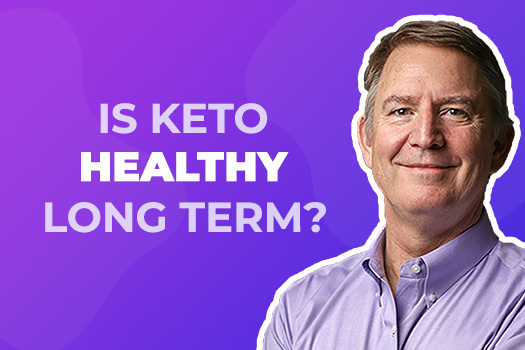The healthfulness of a keto diet in the long term depends on what you mean by a “keto diet.” If you follow a program that’s been clinically tested based on real foods – not these new keto junk foods that are everywhere – and you’re followed by a healthcare practitioner to monitor all the important metabolic parameters, then sure, a keto diet can be healthy long term. Let me give you some context. Going back to 1998 when I was introduced to the Atkins diet by some of my Veterans Affairs patients at the Durham VA Medical Center, I remember that just about everyone “knew” that the Atkins diet was unhealthy – the language was rather that it was “dangerous.”
Eating all that fat had to be bad for you and you had to have carbs to fuel your body, right? At the time, I knew the low-carb, high fat diet could work as two of my patients had it work. Back then, however, I had to convince myself that the approach was safe. Everyone was concerned about it, so we went and learned from doctors who had used this approach throughout their careers – Dr. Atkins, Dr. Eades, Dr. Bernstein, and Dr. Rosedale. We started a research program at Duke University to assess whether this approach was safe. Our first paper was published in 2002. Over the past 20 years, dozens of clinical trials have been done all over the world and if done properly, a real food keto diet is not only safe, but it may even be the best diet to follow if you have the genetics of insulin resistance or if you want to live as long as you can.
For people with insulin resistance, many different diets can work. The low-carb diet, however, works better to lower blood glucose, insulin, blood triglycerides, and can raise HDL cholesterol (the good one). Studies on aging are now pointing to the general principle that keeping blood insulin levels as low as possible can slow the aging process. Carbohydrates in the diet are the biggest dietary cause for raising blood glucose and insulin, so it makes sense that a diet low in carbohydrates would be a good way to keep the insulin levels low and to reduce the aging process. These studies are not definitive, though. They are merely suggestive. Keep in mind also that many different ways of eating can be healthy for the long term if the insulin levels are kept really low.
There is a textbook on ketogenic diets, now in its second edition, and there’s an annual research meeting called the Metabolic Health Summit, where new research is presented on keto diets every year. That’s where I go to present our research and also learn from other people studying the keto diet. Looking back, since we first started the clinical trials on the keto diet, many studies have been done. Some argue that the low-carb diet is now the most studied diet there is, because so many clinical trials have been done because everyone thought it was going to be harmful. We now know that it’s not harmful. It’s even good for you. I look forward to new research about keto diets. It may even turn out that it’s one of the healthiest ways of eating there is.
Check out the full video here.
